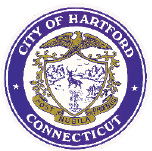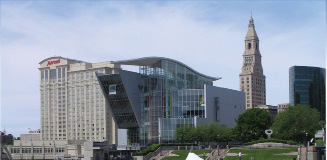


![]()
ONLINE

Future Focused
Editors’ Note
Pedro Segarra is Hartford’s 66th Mayor and was sworn into office on June 25, 2010. Mayor Segarra graduated from what was then called Greater Hartford Community College (now Capital Community College) and earned a full scholarship to the University of Hartford where he received a Bachelor of Arts degree in Political Science. He was then admitted to the University of Connecticut Graduate School of Social Work where he received his Masters Degree of Social Work. In 1985, he graduated from UConn Law School and passed the Connecticut Bar the same year. He is currently admitted to the Connecticut state and federal Bars (1986) and the Bar of the State of Florida (2000). In 1991, he was appointed Corporation Counsel for the City of Hartford – the youngest person ever selected for the position at the time – and was appointed for three consecutive terms. He was appointed to City Council in 2006, elected in his own right in 2007, and became Council President in January of 2010. Up until becoming Mayor of Hartford (http://hartford.gov), he was the managing partner of the Hartford Law Office of Segarra & Associates. He was also a founding member of Hogar Crea, the Hispanic Health Council, and CLARO.

As a result of the global economic crisis, where does Hartford stand today and how is it positioned looking forward?
We have had incredible challenges financially. Our city is a capital city in which about 52 percent of our property is tax exempt. We have a constitutional charter mandate that requires us to fund our pension at 100 percent. And we have a population that has a per capita income of about $29,000, which is extremely poor as compared to the state median income. So it sets us up for a series of expectations on behalf of a community that create incredible political pressure on any municipal leader.
However, I have managed to balance the budget. When I took office, I had only one week to make sure I turned a $3 million deficit around, which I did; I was actually able to create a surplus of $2.8 million because it’s important that we maintain a fund balance in order to enhance our bond rating position.
We were able to fully fund our pension and still continue to provide services to a community that is very needy. This has required that we work closely with the major nonprofit and social services providers, as well as trying to be creative in terms of doing a lot more with a lot less.
I’m optimistic because this city has some incredible institutions. We have three Fortune 500 companies in the city. We have been recognized as the insurance capital of the world, even though we need to make more of an effort to retain that market and expand it. We have some incredible art institutions for a city of our size. We have the first public park and the first public museum in the country. We also have two independent stage companies that have exported their works to Broadway. We’re halfway between Boston and New York, so from an arts perspective, that provides us with a unique opportunity to market those.

How is the education system within Hartford at the K through 12 level and are you effectively addressing the need for reform in the system?
The city has made a significant investment in education. We now have four nationally ranked high schools. We have also made over a half a billion dollar investment in school construction projects.
We have had three years of consecutive increases in test scores and have had the biggest gains in narrowing the achievement gap, which was the largest in the state at one point.
Obviously, if we want to get that median income up from $29,000 and take this city from poverty to prosperity, it’s going to require training our youth to compete for the best jobs. There are 125,000 jobs in the city, most of which require college degrees and advanced skills, and at the present time, our kids aren’t always able to compete. So we have to be mindful that the opportunities will start with education and make sure we develop the programs that will train our kids for the jobs of the future and the jobs that are available in the market.
You have also been focused on law enforcement. How challenging is it to maintain that when you have to make cuts?
It’s extremely challenging. We recently released our 2010 safety report. Over the past five years, we have had close to a 30 percent reduction in Part 1 crimes. And we had an additional 7 percent drop in 2010.
But I need the other elected officials to join me in going out into the communities, because a lot of this is about advocating for communities. So we must engage the communities in a stronger dialogue to support the parents so they can feel more empowered in terms of maintaining control and support of their children.

Has it been important to reach out to the business community within Hartford?
Absolutely, and I have reached out. Hartford committed an additional $5 million to help the nonprofits and community organizations. In the Asylum Hill area, they committed an additional $2 million to purchase and demolish a large building that is an eyesore for the city. That is in addition to another unattractive building we took down in the middle of downtown, creating a more pleasant aesthetic environment. We have about 113 acres of land in the downtown area that’s available to be developed, so that provides a great opportunity for both corporations and the city to grow and prosper.
The public/private partnership is extremely important. Travelers Insurance has been very helpful in supporting an educational effort that has been very successful in terms of working with our different schools and promoting education. We hope to do more of that.
You’ve had to make tough decisions but some of them have really made a difference. Can you appreciate that or is there too much to do to reflect on the past?
I’m still working on trying to reconcile the deficit of $8 million for this year. We’ve offered a retirement incentive; we’re trying to cut and not refill positions; we have a hiring freeze that we only deviate from when there is a critical need; and I don’t have a driver and I pump my own gas. I do things to set an example and to encourage others to recognize that if we’re asking one of the poorest populations in the nation to pay for our salaries and benefits, then they should expect to get the best possible return on their investment.•